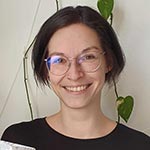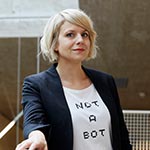ForscherInnen am LIT (Linz Institute of Technology) der Johannes Kepler Universität ist es gelungen, transdisziplinäre Innovationsprojekte zu entwickeln, die beim diesjährigen Ars Electronica Festival präsentiert werden.
Die teilnehmenden Institute initiierten Kooperationen mit internationalen und regionalen KünstlerInnen, DesignerInnen, Forschungsorganisationen und Unternehmen, um kollaborative Prototypen zu entwickeln und ihre Forschung einer breiten Öffentlichkeit zugänglich zu machen. Diese Session bringt vier der ausstellenden Teams – das LIT Robopsychology Lab, die JKU Linz School of Education, das LIT Soft Material Lab und das I Institute for Integrated Circuits und ihren Kooperationspartner g.tec Medical Engineering – zusammen, um ihren kreativen Prozess und die Entwicklung von Prototypen zu diskutieren.
Moderator: Christopher Lindinger (AT)
Speaker: Melanie Baumgartner (AT), Florian Hartmann (AT), Christoph Guger (AT), Markus Hohenwarter (AT), Alicia Hofstätter (AT), Corinna Hörmann (AT), Martina Mara (AT), Kathrin Meyer (DE)
Video
Biographies

Melanie Baumgartner (AT) – a researcher at Johannes Kepler University born in Traun – has set herself the goal to make her work in sustainable, degradable robotics and electronics a reality.

Florian Hartmann (AT) – hailing from Graz, Austria – is physicist developing bio-inspired soft robotics and stretchable electronics at the Johannes Kepler University Linz.

A post-doc researcher, Thomas Faseth (AT) has worked at the Institute for Integrated Circuits at JKU since 2016, and contributed his research to circuits and systems for ultra-low powerful wireless sensing applications that might be used for medical applications.

Christoph Guger (AT) is the founder and CEO of g.tec medical engineering GmbH. In 1999, he developed the first commercial brain-computer interface (BCI) system worldwide. Today, his international company is the leading provider of state-of-the-art invasive and non-invasive BCI systems, with branches in Austria, Spain, the USA and Hong Kong.

Markus Hohenwarter (AT) studied mathematics and computer science at the University of Salzburg in Austria. As part of his master’s thesis he created the open source dynamic mathematics software GeoGebra in 2002. After his PhD he spent three years at universities in Florida before he became a full professor for mathematics education at Johannes Kepler University Linz in Austria in 2010 where he is leading both the department of STEM education and GeoGebra development. In 2013, he received an honorary doctorate in Argentina for his work on the open source mathematics software GeoGebra.

Alicia Hofstätter (AT) holds a master’s degree in mathematics and arts education from Johannes Kepler University Linz and the University of Arts and Industrial Design Linz as well as a bachelor’s degree in media technology and design from the University of Applied Sciences Hagenberg. She is a research assistant at the department of STEM education at the Johannes Kepler University Linz. Together with her team, she investigates the use of GeoGebra in mathematics education and the development of interactive resources to help students explore and bette runderstand mathematical concepts.

Corinna Hörmann (AT) received her Master’s degree in computer science and mathematics education from the Johannes Kepler University Linz, Austria in 2012. She was teaching computer science and mathematics at a high school. Currently she is a University Assistant and PhD Student at the Department of STEM Education at the Johannes Kepler University Linz, Austria. She is working for the COOL Lab, a teaching-learning lab that fosters computational thinking and digital literacy. Her research interests include digital education, computational thinking and digital teaching and learning methods.

Martina Mara (AT) is an Austrian tech psychologist and head of the LIT Robopsychology Lab at the Johannes Kepler University Linz. She earned her doctorate at the University of Koblenz-Landau with a dissertation on anthropomorphic machines. Her current research interests include public attitudes towards AI and trust formation in human-robot collaboration. She is a member of the Austrian Council on Robotics and Artificial Intelligence (ACRAI), a newspaper columnist and has been awarded the Futurezone Award 2018 and the Vienna Women’s Prize 2019, among others.

Since 2019, Christopher Lindinger (AT) is Vice Rector for Innovation and Researchers at Johannes Kepler University Linz. From 2002 to 2019, he was Co-Director of the Ars Electronica Futurelab and responsible for the Research and Innovation. He graduated in computer science at Johannes Kepler University and was a researcher at the University of Illinois Chicago. Lindinger developed innovation strategies for industrial companies or government institutions and teaches at international universities.


